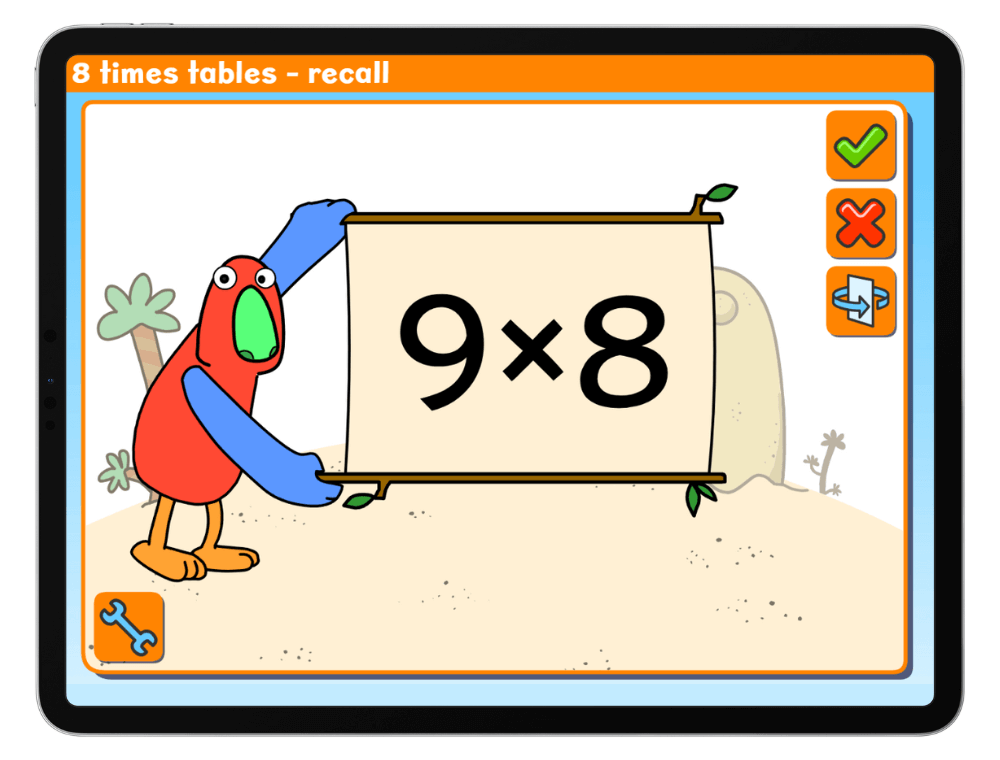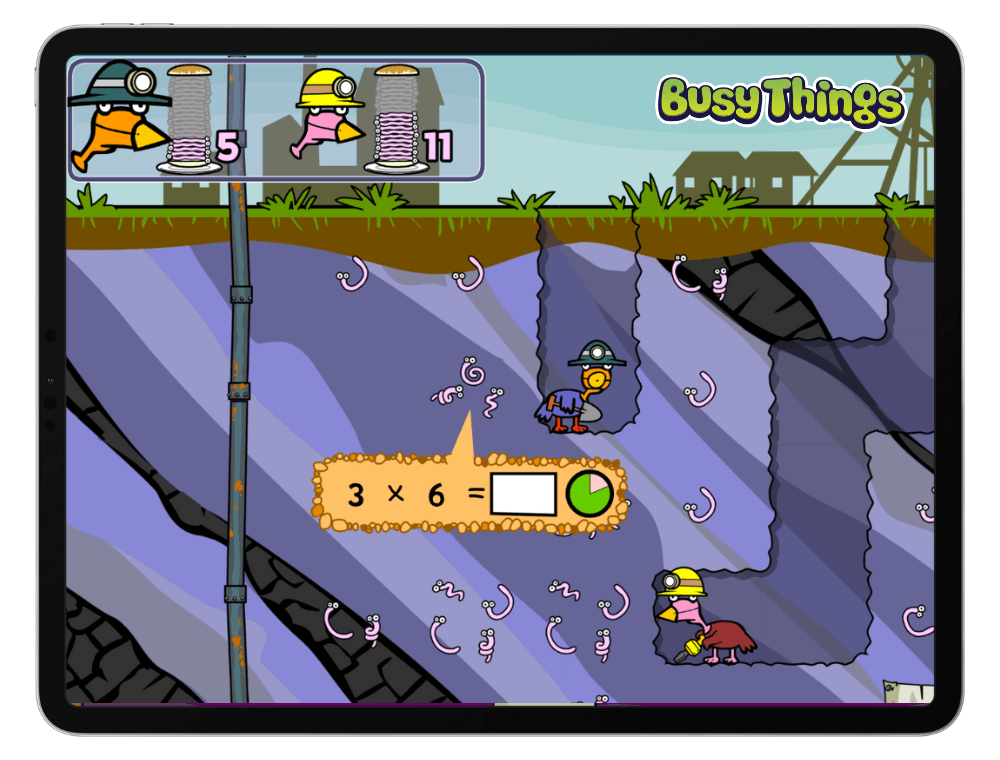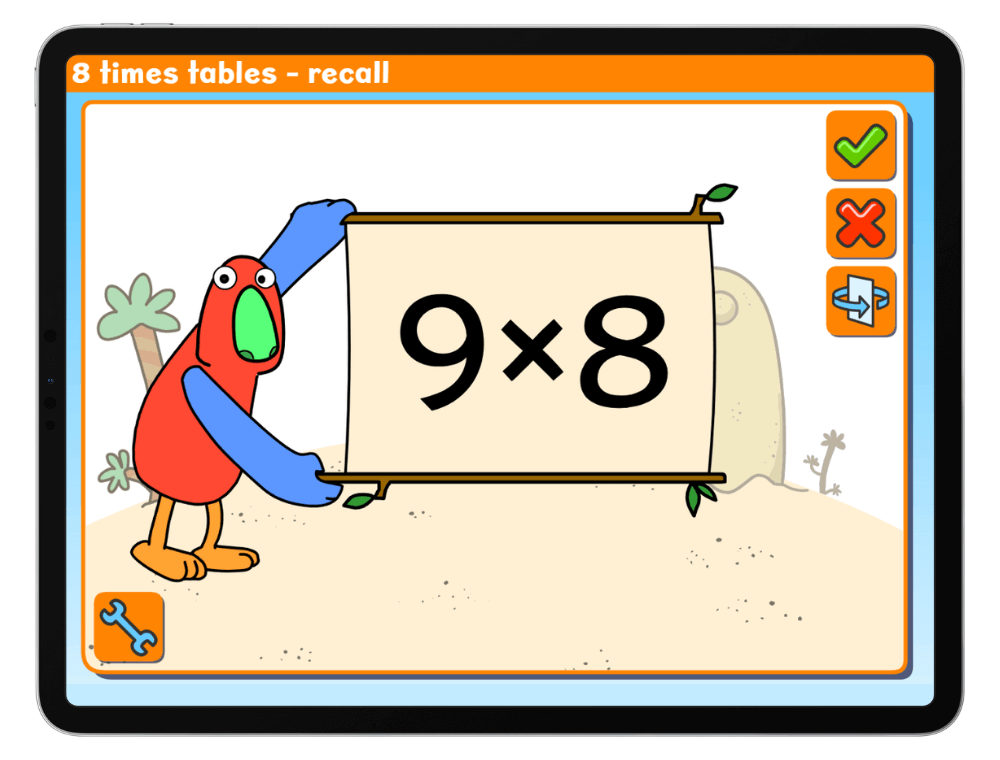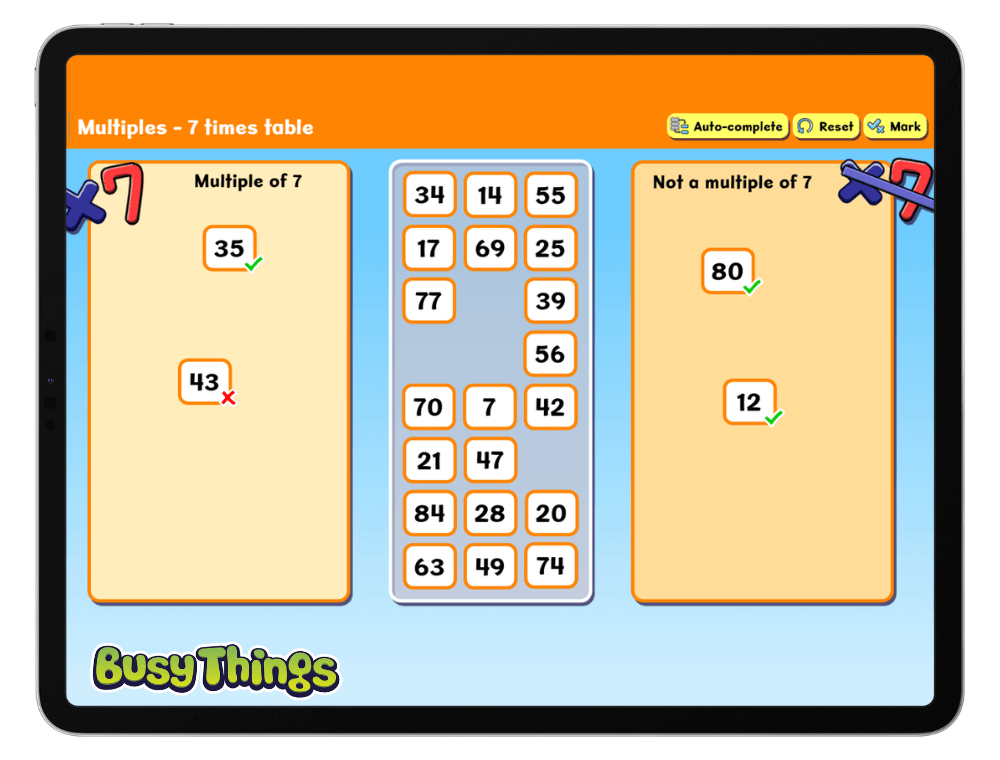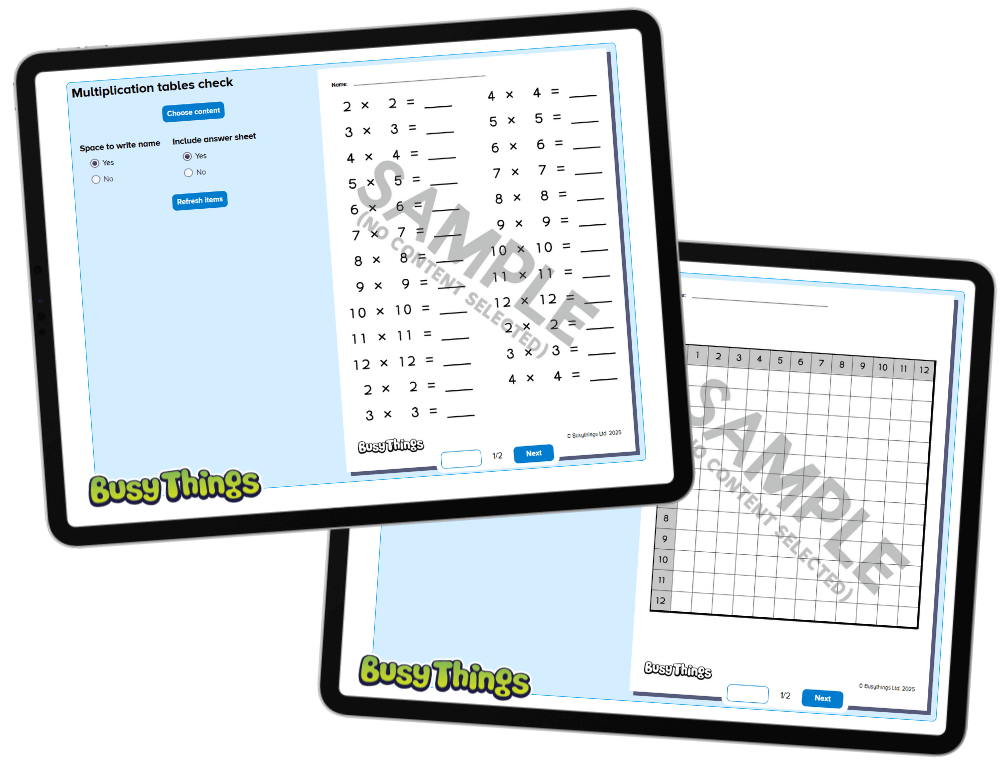Everything You Need to Know About the Year 4 Multiplication Tables Check (MTC)
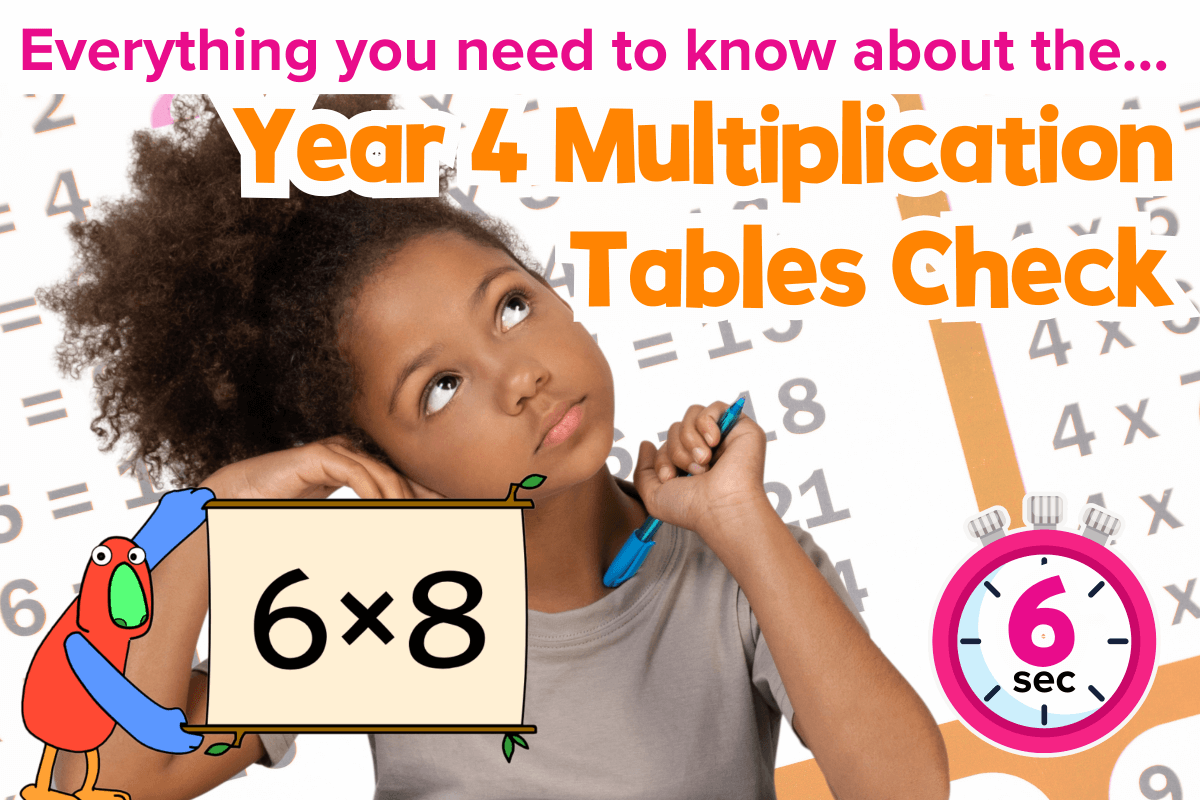
The Multiplication Tables Check (MTC) is coming up in June for all Year 4 pupils in England – a short online test that checks how well children know their times tables.
Here’s everything you need to know about the MTC – what it involves and how to help your child feel confident and ready!
- What is the Year 4 Multiplication Tables Check (MTC)?
- When does the MTC take place?
- Why do children take the MTC?
- Which times tables should my child know by Year 4?
- Which are the hardest times tables to learn?
- How to help your child feel confident and prepared
- Fun ways to practise times tables
- Busy Things times table games and tools
- FREE Times Tables Practice Activity Pack
What is the Year 4 Multiplication Tables Check?
The MTC is a short online test that checks whether your child can recall multiplication facts up to 12 × 12 — a key part of the Year 4 maths curriculum.
Here’s how it works:
- The test is done on a computer or tablet.
- Children are asked 25 times tables questions.
- They have 6 seconds to answer each one.
- It takes less than 5 minutes to complete.
- The focus is on speed and accuracy — not written methods
Teachers will aim to keep it low-key so children aren’t worried. There’s no pass or fail. Instead, the results help schools spot which children might need extra support.
When is the Multiplication Tables Check?
The 2025 MTC test window runs from Monday 2nd June to Friday 13th June. Each school chooses when to administer the test within this period.
Why do children take the Multiplication Tables Check?
Times tables are the building blocks of primary maths. The faster children can recall them, the more brain space they have for tackling trickier problems.
Quick times table recall helps with:
- Division
- Fractions
- Area
- Problem-solving
- And more!
The MTC helps schools identify any gaps, so children don’t fall behind as maths gets trickier in Years 5 and 6.
Which times tables should my child know by Year 4?
By the end of Year 4, children are expected to have rapid recall of all their multiplication facts up to 12 × 12.
They should be confident answering questions like:
- 7 × 6 = 42
- 9 × 8 = 72
- 12 × 4 = 48
- …without counting on fingers or working it out. Speed is key!
Which are the hardest times tables to learn?
Many children (and adults!) stumble on:
- The 6s, 7s, 8s, 9s and 12s
- Mixed questions (e.g. switching between tables like 9 × 4 and 6 × 7)
Top tip: If you’re short on time, give these harder tables a little extra focus — but don’t forget to mix in some your child already knows well too. That way, they build confidence alongside recall speed.
Does my child need to revise for the Multiplication Tables Check?
No formal revision needed – but regular, playful practice makes a big difference. Children who feel confident with their times tables will find the rest of the maths curriculum easier to master.
How can I help my child prepare for the MTC?
Here are a few tried-and-tested ways to build confidence in times tables:
- Practise little and often – A handful of quick-fire questions a day is plenty! Do them during the school run or during breakfast.
- Use games and apps – Children learn best through play! Busy Things includes brilliant times table games, flashcards, and interactive worksheets to help children practise multiplication facts in fun, engaging ways.
- Focus on tricky tables – Every child has a few tables that trip them up. Watch out for patterns – are the 7s a struggle? Or maybe the 12s? Spend just a few minutes a day on those tougher facts.
- Say it forwards, backwards and inside out! Try chanting tables, reversing them (e.g. 72 ÷ 8 = ?), or mixing division into the mix. This helps facts stick more deeply.
If your child is feeling anxious about the test or you’re noticing some signs of stress, you might find these helpful:
- Primary school tests: how to help your child manage stress
- Stress in children: spotting the signs and what to do
- 10 stress-busting activities for kids that actually work
How to Make Times Tables Practice Fun (and Effective!)
You don’t need to drill constantly. The trick is to weave it into everyday life — short, playful bursts that feel more like games than “work”. Here’s a couple of ideas…
1. Multiplication Game: Flashcard Races
Make your own flashcards or use Busy Things’ digital times table flashcards:
- Grab a card and both shout out the answer.
- First one to get it right keeps the card.
- Most cards = winner!
- Pretend you’re on a tv quiz!
Let your child quiz you too – they’ll love catching you out!
2. Times Table Dice Games
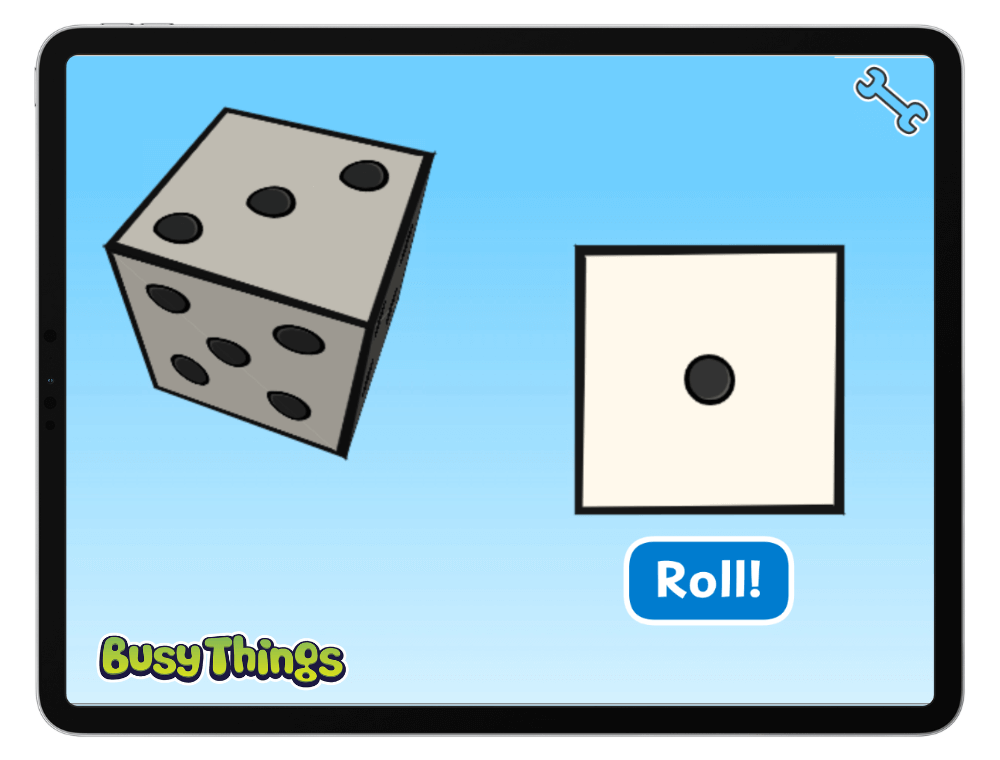
Use real dice or the Busy Things Dice Gadget:
- Roll two numbers
- Multiply them
- How many correct answers in 1 minute?
- Can they beat their score next time?
Perfect for a burst of practice before dinner.
3. Make times tables part of everyday life
Forget sitting down for “revision” sessions. Instead:
- Chant tables on the way to school
- Ask questions during snack time
- Challenge them: “How many 7s can you remember before the kettle boils?”
- Let them test you – they’ll love turning the tables!
These little moments all add up — and keep the mood light.
Try These Busy Things Times Tables Games and Tools
Miner Birds: Times Tables
A fun multiplayer game – play against the computer or a sibling or friend.
- Answer multiplication questions to collect worms.
- First to 20 worms wins!
- Great for practising speed and recall in a fun, competitive way.
Interactive Times Tables Flashcards
Busy Things also includes:
- Digital flashcards – brilliant for independent learning or quickfire quizzes.
- Interactive worksheets – choose the tables your child needs to focus on.
No need to print or prep. It’s all ready to go inside the platform.
Interactive Times Tables Worksheets
These activities help children recognise which numbers belong in which times tables — a key part of pattern spotting.
- Move numbers into ‘multiple of X’ or ‘not a multiple of X’
- Helps cement understanding of number patterns and sequences.
- Choose the tables your child needs to focus on.
No need to print or prep. It’s all ready to go inside the platform.
Times Tables Resource Maker
Create your own printable question sheets and grids for any times tables.
- Completely customisable to your needs – choose the tables your child needs to focus on, or mix them up!
- Generate MTC-style questions or full grids to fill in
- Ideal for offline practice and creating your own times table challenges.
- Challenge children to see how quickly they can complete a worksheet or grid – can they beat their score next time?
Free Printable: Times Table Activity Pack
Want something offline to work through at home?
Download our FREE printable Times Tables Practice Pack, which includes:
- Mixed tables challenges
- Focused grids for tricky tables (6s, 7s, 8s, 9s and12s)
- Challenge children to see how quickly they can complete a challenge – can they beat their score next time?
How Busy Things can help with Multiplication Tables Check practice
With Busy Things, you’ve got everything you need to help your child build confidence and make practice playful:
- Fun games like Miner Birds
- Interactive tools like flashcards and dice gadgets
- Interactive worksheets and printable resources
All designed to make learning times tables fun, fast – and part of your child’s everyday routine.
Start a free trial and explore all our maths games and times tables tools today!
You Might Also Like…
Here are some more useful reads from our blog:
- Fun Ways to Practise Times Tables at Home
- 10 Stress-Busting Activities for Kids That Actually Work
- Primary School Tests: How to Help Your Child Manage Stress
- Building Resilience in Children: A Parent’s Guide (Incl. Free Printables)
Get ready for the Multiplication Tables Check
The Year 4 Multiplication Tables Check doesn’t need to be stressful. With regular playful practice, great resources and a positive mindset, your child can go into it feeling calm and confident.
So, try some Busy Things multiplication games. Download the free times tables grid pack and make it all part of your daily routine!
We’d love to know which activities your child enjoys most – let us know in the comments, or even better – tag us in your practice!
